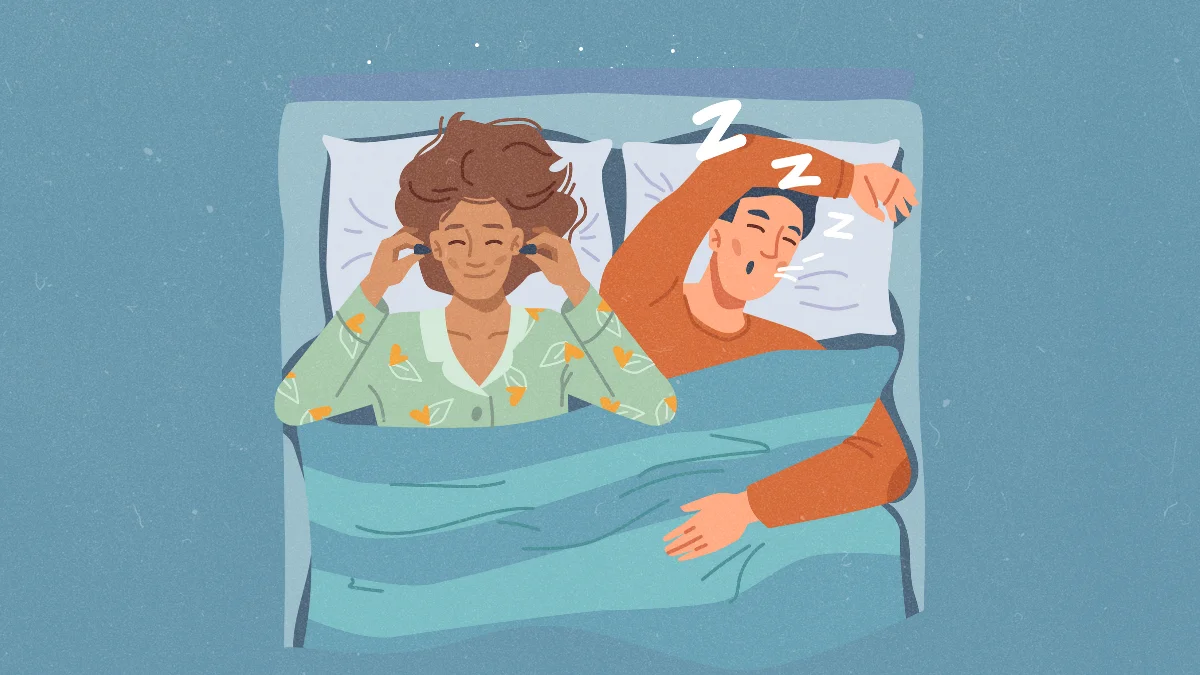Positive affirmations for sleep apnea can transform bedtime into a serene ritual. Imagine drifting into a serene slumber, free from the pesky disruptions of sleep apnea.
As someone who understands the struggles of sleep apnea, I know how vital a peaceful night’s sleep is. By filling your mind with empowering thoughts, you can reduce anxiety and create a calm bedtime routine. I’ve tried it, and trust me, these affirmations work wonders.
From boosting confidence in your breathing to promoting relaxation, they help you reclaim those peaceful Zzz’s. So, let’s dive into the world of positive affirmations and wake up refreshed and ready to conquer the day! 🤩
Table of Contents
Affirm More: Positive affirmations for Insomnia.
What are Sleep Apnea Affirmations?
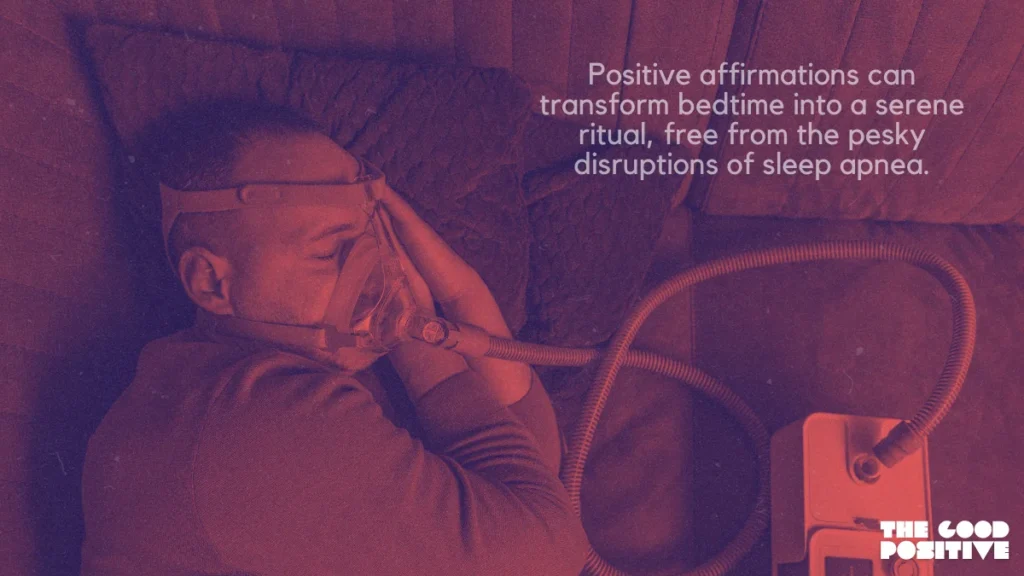
Sleep apnea affirmations are positive statements designed to ease the mind and promote restful sleep for those battling sleep apnea. These uplifting messages encourage a sense of control and calmness, reducing anxiety linked to breathing disruptions at night. For example, “I breathe easily and sleep soundly” can transform your mindset. Affirmations might not replace medical treatments, but they sure add a sprinkle of optimism and empowerment to your nightly routine. ᶻ 𝗓 𐰁
Benefits of Using Positive Affirmations For Sleep Apnea?
💡 Struggling with sleep apnea can feel like a nightly battle, but positive affirmations might be the hidden treasure, especially for those grappling with sleep disorders. Here’s how they can help:
1) Stress Reduction: Affirmations can significantly lower stress levels, which is crucial since stress can exacerbate sleep apnea symptoms. By repeating calming phrases, you can soothe your mind and body before bedtime.
2) Improved Sleep Quality: Affirmations foster a peaceful mindset, setting the stage for a restful night. Think of them as a lullaby for your subconscious, helping you drift into a deeper, more restorative sleep.
3) Enhanced Breathing: Believe it or not, positive affirmations can help improve breathing patterns. By instilling a sense of calm and relaxation, they can reduce instances of apnea events during the night.
4) Boosted Confidence: Regularly practicing affirmations can bolster self-esteem and confidence. For sleep apnea sufferers, this can translate into a proactive approach to managing their condition.
5) Consistency in Routine: Incorporating affirmations into your nightly routine encourages consistency, which is a key component in managing sleep apnea. Consistency helps regulate your internal clock, leading to better sleep hygiene.
7) Supports Healthy Habits: Affirmations can reinforce good habits. Telling yourself, “I make choices that improve my health” can encourage adherence to treatments like CPAP.
6) Holistic Well-being: Beyond just sleep, affirmations contribute to overall well-being. They nurture a positive outlook on life, which can have a ripple effect on your physical health, including managing sleep apnea.
Think of positive affirmations as your nightly lullaby, gently guiding you toward a more peaceful sleep. They’re like a little pep talk for your subconscious, reminding you that you’ve got this, one breath at a time. ⏰
100 Positive Affirmations For Sleep Apnea
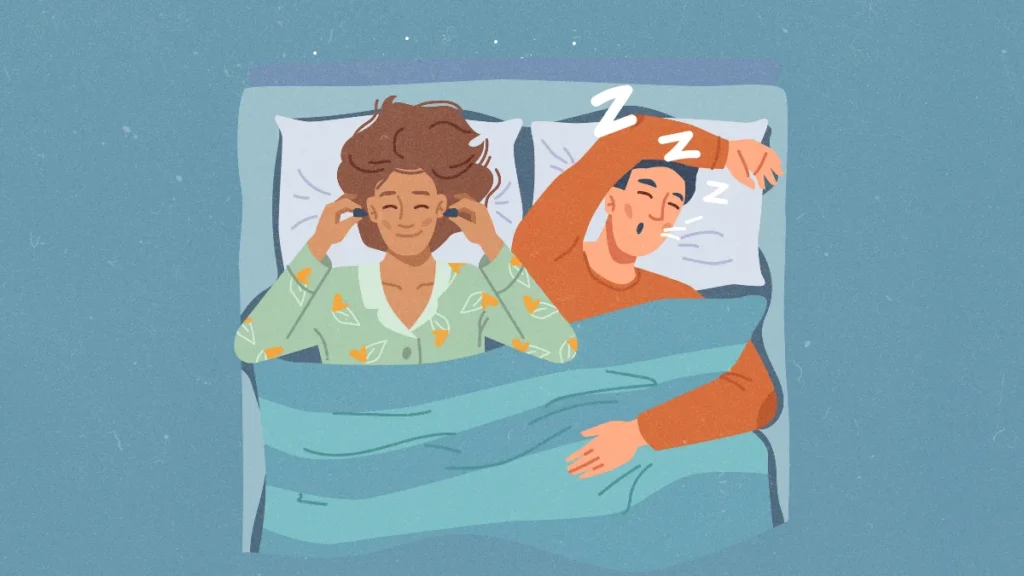
💡 Discover “100 Positive Affirmations for Sleep Apnea,” designed to enhance sleep quality and boost your peace of mind. Recite these empowering phrases nightly, transforming your sleep experience.
📍 Bookmark this page and commit to this soothing ritual for the next 21 days. These positive affirmations help you embrace restful nights and invigorating mornings. Sweet sleep awaits! 🥱
1. “I breathe with ease and calm, despite my sleep apnea.”
2. “My sleep apnea does not define my nights or my days.”
3. “Each night, I find new ways to relax and combat my sleep apnea.”
4. “My body knows how to manage sleep apnea naturally.”
5. “I am in control of my breathing, even with sleep apnea.”
6. “Every night, I snore less and rest more peacefully.”
7. “I wake up refreshed and ready, despite my sleep apnea.”
8. “I am calm and relaxed before bedtime, easing my sleep apnea.”
9. “My sleep apnea is a small part of my healthy sleep habits.”
10. “I face my sleep apnea with a peaceful and strong mind.”
11. “Each disruption is a chance to reset and find calm.”
12. “My medical treatments for sleep apnea work effectively.”
13. “I breathe deeply and fully, overcoming my sleep apnea struggles.”
14. “Stress melts away as I prepare for a good night’s sleep.”
15. “I embrace relaxation techniques to manage my sleep apnea.”
16. “My brain stays sharp and alert, even with sleep apnea.”
17. “Nighttime is my chance to practice deep breathing and calmness.”
18. “I wake up refreshed and free from anxiety, despite my apnea.”
19. “I create a peaceful bedtime routine to reduce sleep apnea symptoms.”
20. “My sleep is deep and restorative, even with sleep apnea.”
21. “I snore lightly, allowing myself and others restful nights.”
22. “I handle sleep apnea disruptions with grace and ease.”
23. “My breathing remains steady and calm throughout the night.”
24. “I use my treatments effectively to manage sleep apnea.”
25. “I find peace and calm at bedtime, improving my sleep.”
26. “I am stronger than my sleep apnea challenges.”
27. “Healthy habits support my journey to better sleep with apnea.”
28. “I trust my body to regulate my breathing each night.”
29. “My mind is calm, and my body is relaxed at bedtime.”
30. “I experience fewer disruptions thanks to my healthy sleep habits.”
31. “I wake up feeling refreshed, regardless of my sleep apnea.”
32. “I approach each night with positivity and calm, easing my sleep apnea.”
33. “I feel peaceful and ready for bed, free from stress.”
34. “My treatments are effective, and my sleep apnea is manageable.”
35. “I breathe freely and fully, even with sleep apnea.”
36. “I snore less and sleep more soundly each night.”
37. “I wake up with energy, despite the challenges of sleep apnea.”
38. “I find calm and peace, preparing my body for a good night’s sleep.”
39. “My sleep apnea is just a small part of my overall health.”
40. “I relax my mind and body before bedtime, reducing disruptions.”
41. “I trust in my ability to manage sleep apnea naturally.”
42. “I breathe deeply and calmly, easing my sleep apnea symptoms.”
43. “I feel refreshed and energized each morning, no matter my sleep apnea.”
44. “My sleep is peaceful, and my breathing is steady.”
45. “I embrace relaxation to combat my sleep apnea every night.”
46. “My sleep apnea does not control my nights; I do.”
47. “I develop healthy habits that support better sleep.”
48. “I wake up with a clear mind, despite nighttime disruptions.”
49. “I face my sleep apnea with a calm and relaxed approach.”
50. “I breathe easily, ensuring a restful night’s sleep.”
51. “I feel at peace with my sleep apnea management.”
52. “I use every disruption as a moment to practice calm breathing.”
53. “My sleep is restorative, helping me overcome sleep apnea.”
54. “I am in control of my bedtime routine, minimizing sleep apnea.”
55. “I create a peaceful environment for better sleep every night.”
56. “I wake up feeling refreshed, with or without sleep apnea.”
57. “My sleep apnea is manageable, and I am stronger than it.”
58. “I focus on calmness and relaxation to improve my sleep.”
59. “My breathing is steady and calm, reducing sleep apnea symptoms.”
60. “I approach each night with positivity and relaxation.”
61. “I feel refreshed and energized, despite sleep apnea disruptions.”
62. “I find peace and calm at bedtime, aiding my sleep.”
63. “I develop healthy habits that support my sleep apnea management.”
64. “My breathing is deep and calm throughout the night.”
65. “I trust my treatments to work effectively against sleep apnea.”
66. “I snore less and breathe better each night.”
67. “I wake up ready and refreshed, regardless of my sleep apnea.”
68. “I embrace relaxation techniques to combat nighttime stress.”
69. “My sleep apnea is a small part of my journey to better health.”
70. “I relax my mind and body, reducing sleep apnea disruptions.”
71. “I trust my body to manage my sleep apnea naturally.”
72. “I breathe deeply and calmly, even with sleep apnea.”
73. “I wake up feeling refreshed and full of energy.”
74. “My sleep is peaceful and restorative every night.”
75. “I find calm and peace, preparing for a restful sleep.”
76. “I am stronger than the challenges of sleep apnea.”
77. “I develop habits that support better sleep and overall health.”
78. “I trust my treatments and manage my sleep apnea effectively.”
79. “I snore lightly, allowing for restful sleep.”
80. “I wake up feeling energized and ready, despite sleep apnea.”
81. “I face each night with positivity and relaxation.”
82. “My sleep apnea does not define my sleep quality.”
83. “I create a calm environment for better sleep.”
84. “I trust my body’s ability to manage sleep apnea naturally.”
85. “I breathe deeply and calmly throughout the night.”
86. “I feel refreshed and ready each morning.”
87. “My sleep is deep and restorative, overcoming sleep apnea.”
88. “I embrace relaxation techniques to improve my sleep.”
89. “I manage my sleep apnea with a calm and positive approach.”
90. “I develop healthy habits that support my sleep quality.”
91. “I snore less and breathe better each night.”
92. “I wake up feeling energized and refreshed.”
93. “I find calm and peace at bedtime, reducing disruptions.”
94. “I am in control of my sleep apnea and manage it well.”
95. “I relax my mind and body, preparing for restful sleep.”
96. “My breathing is steady and calm, even with sleep apnea.”
97. “I trust my treatments to be effective against sleep apnea.”
98. “I snore lightly, allowing for better sleep.”
99. “I wake up feeling refreshed and ready for the day.”
100. “My sleep is peaceful, and I manage my sleep apnea with ease.”
How To Use Positive Affirmations For Sleep Apnea?
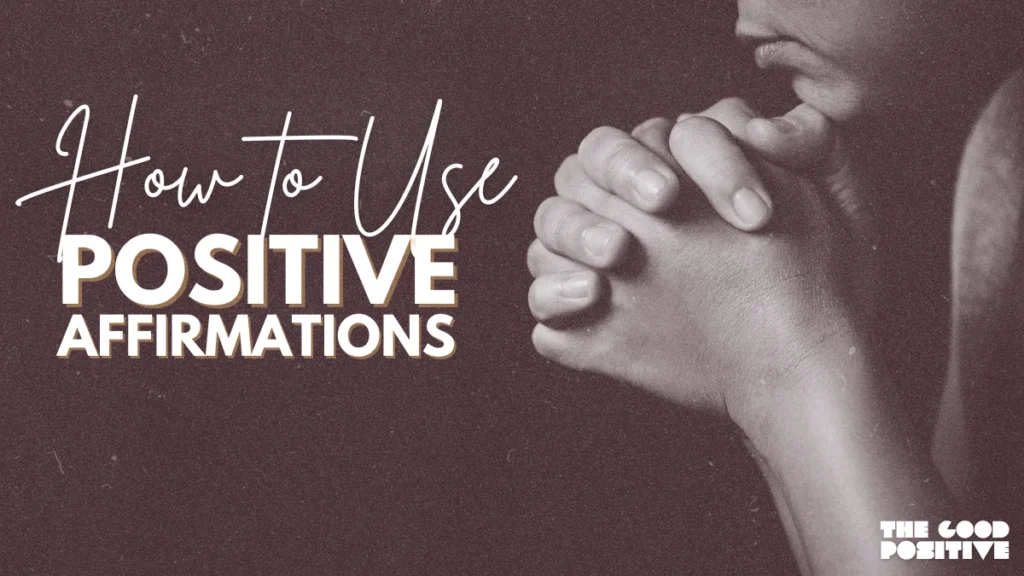
📝 Positive affirmations can be a surprisingly effective tool for managing sleep apnea. Here’s how to incorporate them into your bedtime routine:
- Personalize Mantras: Focus on phrases that target relaxation and breathing, such as “I breathe easily and deeply throughout the night.” These can help reduce anxiety around sleeping with apnea.
- Target Affirmations: Tailor your affirmations to address your unique experiences with sleep apnea. For example, “I am in control of my sleep and breathe effortlessly” can be more impactful if it resonates with your personal struggles.
- Create a Calm Environment: Pair your affirmations with a calming bedtime routine. Dim the lights, play soft music, and maybe even light a lavender-scented candle. Your brain will start associating these cues with relaxation and better sleep.
- Breathe Deeply: Incorporate deep breathing as you recite your affirmations. This not only reinforces the message but also calms your body, making you feel like you’re floating on a cloud.
- Stay Positive: Focus on what you want, not what you don’t. Instead of “I won’t wake up gasping,” try “I enjoy deep, uninterrupted sleep.” Your subconscious is a bit like a puppy—it responds best to positive commands.
Using positive affirmations is a delightful way to remind yourself that better sleep is within your reach. Who knew taming the sleep apnea beast could be this empowering and fun? 😉
FAQ’s
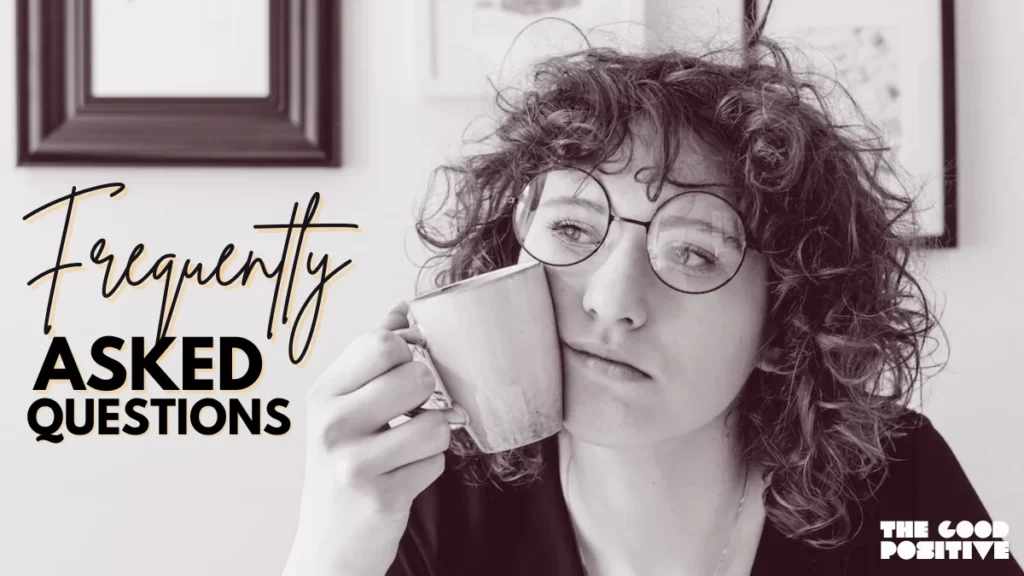
-
What is sleep apnea?
Sleep apnea is a chronic sleep disorder characterized by repeated interruptions in breathing during sleep. These interruptions, called apneas, occur when the airway becomes blocked or collapses, or when the brain fails to send signals to the muscles that control breathing. This condition leads to fragmented sleep, reduced oxygen levels in the blood, and can result in severe health issues like cardiovascular disease, hypertension, and daytime fatigue.
-
How do you fix sleep apnea?
Treating sleep apnea typically involves lifestyle changes, continuous positive airway pressure (CPAP) therapy, oral appliances, and in some cases, surgery. The appropriate treatment depends on the severity and underlying cause of the condition.
-
What are the warning signs of sleep apnea?
Warning signs include loud snoring, episodes of breathing cessation during sleep, abrupt awakenings accompanied by gasping or choking, morning headaches, excessive daytime sleepiness, and difficulty concentrating.
-
How do you fix sleep apnea naturally?
Natural remedies for sleep apnea focus on lifestyle changes such as losing weight, exercising regularly, avoiding alcohol and smoking, sleeping on your side, and maintaining a regular sleep schedule. These measures can alleviate symptoms, especially in mild cases.
-
Is it okay to live with sleep apnea?
Living with untreated sleep apnea is not advisable as it can lead to serious health complications like hypertension, heart disease, stroke, diabetes, and cognitive impairment. Seeking treatment improves quality of life and reduces health risks.
-
How can positive affirmations help with sleep apnea management?
Positive affirmations can support sleep apnea management by reducing stress and promoting a positive mindset. This can improve adherence to treatment plans and overall sleep hygiene, potentially mitigating symptoms and enhancing overall well-being.
-
Can repeating affirmations before bed improve sleep apnea symptoms?
Repeating affirmations before bed can help improve sleep apnea symptoms by reducing stress and promoting relaxation, which may enhance sleep quality. While affirmations alone won’t cure sleep apnea, they can complement medical treatments and support better sleep hygiene.
-
How do positive affirmations influence the sleep patterns of sleep apnea patients?
Positive affirmations can influence sleep patterns by reducing anxiety and creating a calm mental state before bedtime. This psychological relaxation can help individuals fall asleep more easily and potentially experience fewer disruptions, leading to improved overall sleep quality.
-
Are there any studies on the impact of affirmations on sleep apnea?
Currently, there is limited research specifically linking affirmations to sleep apnea. However, studies on the general benefits of positive affirmations and stress reduction suggest that these practices can improve sleep quality and mental well-being, which may indirectly benefit those with sleep apnea.
-
How often should I use positive affirmations to see an improvement in my sleep apnea?
Integrating affirmations into your daily routine, especially before bedtime, can help reinforce their benefits against apnea. Practicing positive words nightly for several weeks may yield noticeable improvements in sleep quality and stress levels.
-
Can affirmations help reduce the anxiety associated with sleep apnea?
Affirmations can effectively reduce anxiety associated with sleep apnea by fostering a positive and calming mindset. This reduction in anxiety can lead to a more restful sleep environment, making it easier to adhere to treatment plans and manage symptoms.
-
What is the best way to integrate positive affirmations into a bedtime routine for sleep apnea?
To integrate affirmations into your bedtime routine, choose a quiet moment before bed to recite them. Combine this practice with other relaxing activities, such as deep breathing exercises or meditation, to create a calming pre-sleep ritual. This holistic approach can enhance the overall effectiveness of affirmations.
-
What are short positive affirmations for sleep apnea?
“Each night, I breathe easily and effortlessly.”
“My body knows how to keep my airways clear.”
“I wake up refreshed and energized.”
“I sleep deeply and soundly through the night.” -
What are sleep affirmations for healing?
“My body heals itself while I sleep.”
“Every breath I take in sleep heals my body and mind.”
“I wake up healthier and stronger every day.”
“Sleep brings me profound healing and rejuvenation.” -
What are positive statements for sleep apnea?
“My sleep is calm and uninterrupted.”
“My breathing is steady and smooth while I sleep.”
“I am in control of my sleep and breathing.”
“Restful sleep is my natural state.” -
What are subconscious affirmations while sleeping?
“I am deeply relaxed and at peace.”
“My subconscious mind is calm and restful.”
“I trust my body to take care of me as I sleep.”
“Positive energy surrounds me while I sleep.” -
What are positive affirmations for sleep disorder?
“I find it easy to fall asleep and stay asleep.”
“Every night, I enjoy deep and restorative sleep.”
“My mind and body are ready for a restful night’s sleep.”
“I deserve and receive quality sleep every night.” -
What are positive affirmations for sleep anxiety?
“I release all worries and embrace peaceful sleep.”
“My mind is calm, and I fall asleep with ease.”
“I am safe and secure as I sleep.”
“Sleep brings me tranquility and restfulness.”
Conclusion
Positive affirmations for sleep apnea are a life-changer. This article is not just a guide; it is a lifeline, offering an empowering strategy to conquer sleep apnea’s challenges.
These empowering words boost your confidence and soothe your mind, making restful nights a reality. With each affirmation, you are building a fortress of calm and control, turning bedtime into a beacon of hope.
Your journey to better sleep starts now because you deserve nights full of peace and mornings brimming with energy. Here’s to dreaming big and breathing easy! 👃😴
Affirm More: Positive Affirmations for Sleep Anxiety.

Aldvin is the proud owner of “thegoodpositive.com.” A passionate writer and supporter of body positivity. Advocate of plus-size fashion. He’s mission is to curate the latest trends and timeless fashion for plus size women. He wants to inspire confidence and creativity through fashion, helping curvy women express their unique personalities with every outfit.

